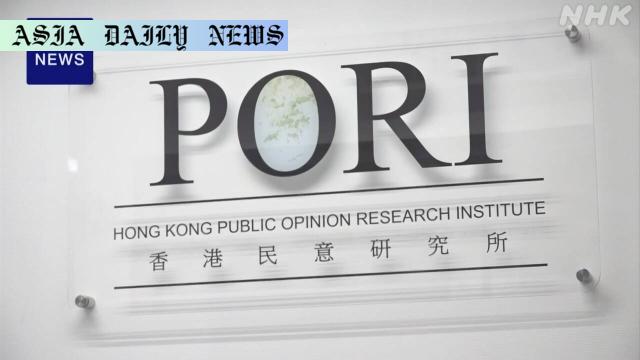Opinion Polls: A private-sector survey institute in Hong Kong, operating since the 1990s, halts research under growing pressure.
- Key Point 1: Hong Kong Public Opinion Research Institute halts operations indefinitely after 30 years of activity.
- Key Point 2: Cites challenges under the political pressure stemming from the national security law established in 2020.
- Key Point 3: Police raids and legal threats have targeted the institute, including its senior officials and president.

Shocking Blow: 30+ Years of Opinion Polls Suspended
Introduction: A Legacy Ends Abruptly
The Hong Kong Public Opinion Research Institute (HKPORI), a think tank that has served as a significant barometer of public sentiment for over three decades, has announced the suspension of its research activities. This decision represents a monumental shift in Hong Kong’s socio-political and academic landscape. The institute has been a vital source of data on numerous key issues, including Hong Kong governmental performance, freedom of speech, and human rights evaluations in the city and mainland China. The abrupt halt is attributed to increasing political and legal pressure that started intensifying after the enactment of the national security law in 2020.
The Historical Role of HKPORI
Since its founding in the early 1990s, HKPORI has been a reliable and consistent voice in gauging public opinion. Its surveys were pivotal in holding both local and central governments accountable by providing data-backed analyses. Before Hong Kong’s transition back to Chinese sovereignty from British rule in 1997, the institute had already etched its role as a pioneer in social science initiatives. Its commitment to objective, evidence-based research earned it widespread recognition among academics, journalists, and the public alike.
Challenges Under the National Security Law
The enactment of Hong Kong’s national security law in 2020 marked a pivotal moment for the region. The law, which aims to curb dissent and crack down on anti-government activity, has profoundly impacted political freedoms and civil liberties in the region. HKPORI became one of its not-so-subtle victims. Facing allegations of inciting subversion and unrest, the institute saw a wave of threats—both legal and reputational. A former senior member now living in Britain found himself on a wanted list, accused of instigating secession through his online statements.
Escalating Scrutiny and Legal Pressure
In December 2022, the situation escalated when Hong Kong police placed a former senior member of the institute on a wanted list for allegedly inciting separatism. This was followed by police visiting the institute’s premises in January 2023, questioning its president, and challenging the operational transparency of its research practices. These measures placed the institute in an increasingly precarious position, challenging its ability to carry out independent research without interference.
The Decision to Suspend Operations
In its announcement to suspend operations indefinitely, HKPORI stated that it has always been law-abiding but found the current environment untenable for scientific polling. This decision highlights the growing risks faced by organizations attempting to maintain intellectual integrity and independence in Hong Kong’s increasingly restrictive political landscape. Indeed, the institute’s closure marks an end to a tradition of honest, data-driven auditing of governance through public sentiment.
Impact on Hong Kong’s Civil Society
The indefinite suspension of HKPORI is not just a standalone incident; it signals worrying trends in Hong Kong’s civil society. Academic and policy-based institutions, traditionally seen as impartial and necessary checks within democratic or semi-democratic systems, are now working under duress. For Hong Kong residents, the absence of reliable opinion poll data disrupts their ability to gauge public sentiment on various political and social issues.
Conclusion: A Loss for Transparency
The suspension of the Hong Kong Public Opinion Research Institute extends beyond the cessation of polling. It reflects changing times where free expression and academic inquiry face vast hurdles. While the think tank vows compliance with the law, its closure leaves a void, not just in the academic world but in Hong Kong’s social conscience. The incident serves as a stark reminder of the utmost importance of protecting institutions integral to maintaining transparency and freedom.



Commentary
Commentary: The Decline of Free Inquiry
A Chilling Moment for Freedom and Research
The suspension of the Hong Kong Public Opinion Research Institute resonates far beyond the walls of academia. It is not simply the closure of a polling institute—it is a sobering indicator of the constraints being placed on the critical principles of free inquiry and the dissemination of knowledge. In societies where political conditions overly dictate acceptable discourse and activities, the independent mechanisms that safeguard transparency falter. The implications of this development are troubling and extensive.
Why Opinion Polls Matter
Opinion polls are more than mere statistic-gathering efforts; they are a barometer of societal well-being and sentiment. By preemptively suspending their activities, HKPORI has shed light on the existential challenges faced by similar organizations. Public opinion research equips citizens and governments alike with actionable data to bridge the gap in governance. The loss of this voice diminishes democratic accountability and will undeniably lead to irreversible information gaps.
Reflection and Call to Action
This suspension invites reflection, not just on Hong Kong’s political evolution but on the importance of safeguarding free institutions globally. It is imperative that civil societies and international communities alike amplify these stories, offering avenues of support to organizations like HKPORI. By doing so, we ensure that academic work continues to thrive even under challenging conditions. In the meantime, one can only hope that this is not a permanent chapter but a temporary pause in Hong Kong’s journey towards transparency and intellectual freedom.